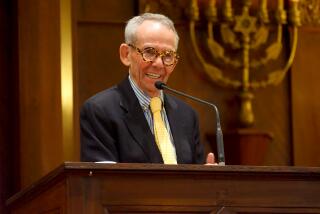Book Review : Novel Strangles on Excess of Dialogue
Heaven and Earth by Frederic Raphael (Beaufort Books: $16.95)
Frederic Raphael has written novels, stories, screenplays, translations, as well as biographical and critical nonfiction, but may be best known in this country as the author of the Academy Award-winning original screenplay for âDarlingâ and of the delightful six-part television import, âThe Glittering Prizes,â which followed the tangled lives of some young men and women who first became acquainted as students at Cambridge. The central character, a winsome, witty young English Jew named Adam Morris, was played with just the right touch of self-mocking melancholy by actor Tom Conti.
âHeaven and Earthâ is an ambitious novel filled with scintillating, sparkling, allusive--and often elusive--dialogue, much of it so self-consciously witty that one feels like protesting âPeople donât talk like that.â It is, in fact, easier to hear the dialogue in the mindâs ear if one imagines it spoken by Tom Conti (or some other self-effacing, quick-witted charmer). But itâs not just the dialogue: The narration is much the same. The novelâs hero cannot even mail letters without eliciting a display of verbal fireworks from the author: âGideon fed the metal mouth a mongrel sandwich of buff and white envelopes, business and persona. . . .â
The style is the man. An unabashedly talky novel, even with its heavy doses of action in the forms of sex, rape and violence, âHeaven and Earthâ takes as its main subject the very style in which it is written: the brilliant, skittish style of talent driven to distraction.
Gideon Shand, once a promising young historian, years ago forfeited his academic career by writing a review that justly but impoliticly attacked the work of a senior Fellow. He earns an uncertain living as a free-lance writer, his income supplemented by his wifeâs work as a physiotherapist. As a kind of intellectual entrepreneur, he recognizes that his independence has been purchased at a steep price: âIn order to be dependent on nothing in particular, he had become dependent on everything in general. . . .â
When his son becomes the target of neighborhood bullies, Gideon accepts a friendâs invitation to move to the country. Stephen Hellman, a highly successful barrister, is generous, brilliant, and very much like Gideon. He is said to have influenced Gideon, a point somewhat dulled by the fact that both Gideon and Gideonâs precocious teen-age daughter sound more like Stephen than Stephen does, as if they were the originals and he the copy.
As Gideon is haunted by his loss of an academic career, Stephen, who is Jewish, cannot overcome his sense of being an outsider in the English society that seems to have embraced him. But Gideon and Stephen are bound by deeper ties, as is gradually revealed. Structurally, this is a flaw, because the story is told so much from Gideonâs viewpoint that it seems disingenuous to surprise the reader with information that Gideon and other characters have known all along.
One cannot help suspecting that the construction of this novel has been undermined by Raphaelâs experience in film and television, where it would have been both appropriate and effective to unfold the plot in this manner, disclosing more and more of what the characters know through dialogue and dramatic confrontation. Raphael also tries to generate meaning merely by juxtaposing scenes (montage) rather than by explaining and developing motivation in classically novelistic fashion.
Perhaps the chief problem with this rich, distinctively written, but finally disappointing novel may be attributed to its dependence on âeverything in generalâ instead of something in particular. The reader finds himself rooting for its success: the characters are complex people leading realistically complicated lives, the themes--friendship, betrayal, success, failure, marriage, infidelity, love and hate--all command attention. But no single theme is fully explored, and the reader soon feels he has wandered into a maze of blind alleys from which no core of meaning can be extricated.
More to Read
Sign up for our Book Club newsletter
Get the latest news, events and more from the Los Angeles Times Book Club, and help us get L.A. reading and talking.
You may occasionally receive promotional content from the Los Angeles Times.







